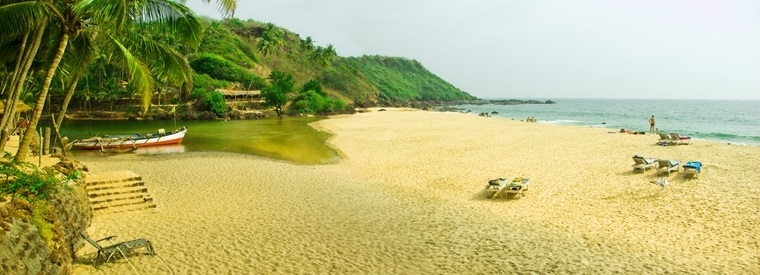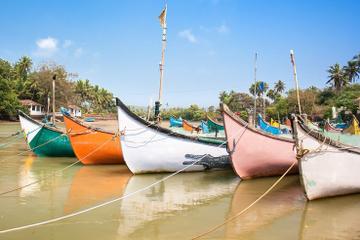« INDIA • Discover India • West India • Goa
Discover Magical Goa
Renowned for its beaches, places of worship and world heritage architecture, Goa is visited by large numbers of tourists each year. It also has rich flora and fauna, owing to its location on the Western Ghats range, which is classified as a biodiversity hotspot. Panaji is the state's capital, while Vasco da Gama is the largest city. The historic city of Margao still exhibits the cultural influence of the Portuguese.
A | B | C | D | E | F | G | H | I | J | K | L | M | N | O | P | Q | R | S | T | U | V | W | X | Y | Z
» Ancestral Goa Center
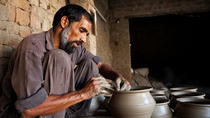
The Ancestral Goa Center, known by locals as the Big Foot Museum for its large foot-shaped dance floor, is one of the main attractions in the Goan village of Loutolim. Local artist Maendra Jocelino Araujo Alvares, the man behind the museum, created the mini nineteenth century Goan village to help preserve the culture and traditions of the region for generations to come. A visit to the Ancestral Goa Center offers a window into some of the area's unique past times …
» Basilica of Bom Jesus
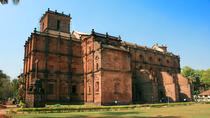
The Basilica of Bom Jesus, a church dedicated to the worship of baby Jesus, is also home to the remains of Francis Xavier, Goa's patron saint and one of the original seven founders of the Jesuit order. The church was erected in Old Goa, the former Portuguese colonial capital, between 1594 and 1605 by Florentine sculptor Giovanni Batista Foggini out of red stone sourced from the area. The withered remains of the saint, known throughout the Catholic world …
» Dudhsagar Falls
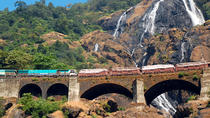
The 1,017 foot tall Dudhsagar Falls is one of the tallest waterfalls in India, and making the trek to the falls is a great way to get away from the beaches for the day and experience a wilder side of Goa. Bring along snacks and a beach towel and make a day of it. According to legend, Dudhsagar, meaning 'Sea of Milk', was created when a princess bathing beneath the falls poured a jug of sweet milk in front of her body to hide her nakedness from the eyes of a prince …
» Fontainhas
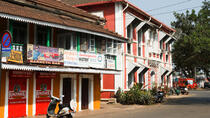
Strolling the cobbled streets of Fontainhas, the Latin quarter of Goa's capital city, feels more like being in old Portugal than in India. The neighborhood in eastern Panaji consists of streets lined with pastel-hued, old mansions dating back to the mid 1800s, where local residents sit out on colonnaded balconies and watch life go by at the leisurely pace Goa is famous for. Most of the historic homes haven't been renovated; but they all receive a fresh coat of pastel paint …
» Fort Aguada
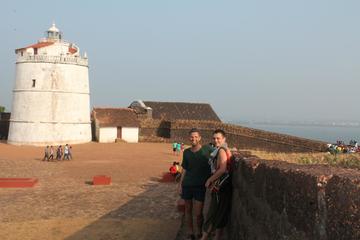
Fort Aguada, the largest and best preserved of Goa's Portuguese bastions, was constructed between 1609 and 1612 to protect Old Goa from Dutch enemies attacking via the Mandovi River. Set on a hill overlooking Aguada Bay and the Arabian Sea, the fort housed a freshwater spring that provided water to passing ships and gave the fort its name. What remains of the sprawling fort remains largely intact, thanks in part to the fact that it was never taken by force during the four century rule of the Portuguese in Goa …
» Fort Aguada and Lighthouse
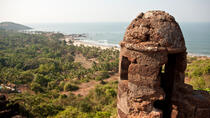
Perched on top of a hill overlooking the Arabian Sea, Fort Aguada and its lighthouse once guarded the Portuguese colony against Dutch and Marathas invaders. Built in 1612, the fort is the best preserved and most impressive of any in Goa. While the large moat and 79 cannons once served to protect India's Portuguese colonies, Fort Aguada, named after the freshwater springs within its walls, also replenished water supplies of passing ships …
» Old Goa (Ela)
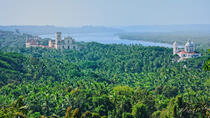
From the sixteenth to eighteenth century, Old Goa (Ela) served as the colonial capital of Portuguese-India and was one of the richest cities anywhere in Asia, with a population exceeding that of both Lisbon and London. While repeated cholera and malaria outbreaks eventually forced the capital to be moved to Panaji in 1843, the old, atmospheric churches, cathedrals and convents of Old Goa remain largely intact. All the sites of Old Goa can be reached by foot …
» Palolem Beach
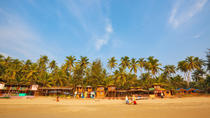
Palolem Beach, nicknamed Paradise Beach, is the southernmost stretch of sandy coastline in Goa and one of the most stunning in all of India. The crescent-shaped cove, with its clear turquoise waters and palm trees lining white sand, was once one of the most tranquil spots in Goa, but the influx of tourists in recent years has brought with it vendors, restaurants, bars, clubs and hotels. Today the stretch of beach has become somewhat of a Bohemian haven …
» Panaji (Panjim)
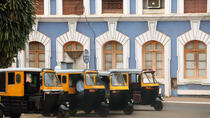
I 1759, when repeated bouts of malaria, cholera and finally Bubonic plague overwhelmed the magnificent city of Old Goa, the colonial capital was relocated to Panaji (Panjim). Today, the narrow, winding cobblestone streets, whitewashed churches, Mediterranean-style buildings in every shade of pastel, and the easy-going attitude of the residents make Panaji a perfect home base for exploring nearby Old Goa. Many visitors to Goa miss out on the cultural treasure …
» Sahakari Spice Farm

Indian food is known the world over for its distinctive and rich spice profile, and taking a tour of the Sahakari Spice Farm gives visitors an understanding of the importance and impact of these spices in India. Get a crash course in the history, medicinal and culinary uses of a wide range of spices, nutmeg, curry leaves, turmeric and cardamom to name a few. Unless you plan to travel to Kerala, where spice farms abound, a stop at the Sahakari Spice Farm is a must …
» St Catherine's Cathedral (Sé Cathedral)
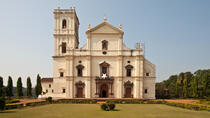
Some of the most visible legacies of the Portuguese colonial period in Goa are the churches, chapels and cathedrals. St Catherine's Cathedral (Sé Cathedral) is the largest such structure in Old Goa and the seat of the Archdiocese in the state. The grand white Portuguese-Gothic structure was built from 1562 to 1619 by order of the King of Portugal, and the altars were completed several decades later in 1652 …
« INDIA • Discover India • West India • Goa


